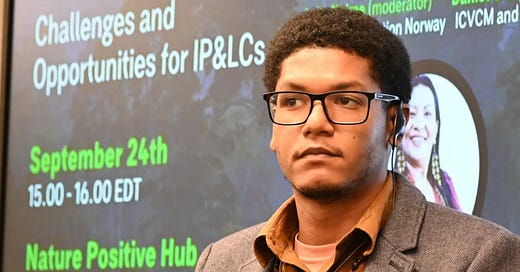Amerindian Peoples Association highlights concerns about REDD in Guyana: “What looks good on paper isn’t always good in practice”
Selling carbon credits to an oil company, “raises contradictions within Guyana’s Low Carbon Development Strategy”.

Last week, during Climate Week 2024 in New York, Nicholas Peters of the Guyanese Amerindian Peoples Association (APA) gave a presentation highlighting concerns about carbon credits and REDD initiatives.
The event, organised by Rainforest Foundation US and Rainforest Foundation Norway, was titled “Social Integrity within Voluntary Carbon Markets: Challenges and Opportunities for Indigenous Peoples and Local Communities”.
In his presentation, Peters said,
“One thing we’ve learned is that what looks good on paper isn’t always good in practice. While Guyana has laws protecting the rights of Indigenous Peoples and ensuring their right to free, prior, and informed consent, the quality of that engagement, particularly regarding carbon markets involving Indigenous lands, has been insufficient.”
REDD credits for oil
ExxonMobil, Hess Corporation, and China’s CNOOC are drilling for oil off the coast of Guyana following discoveries of massive oil reserves in 2015.
In December 2022, Guyana’s President Irfaan Ali announced that Hess Corporation would buy US$750 million worth of carbon credits generated from the country’s forests.
In 2023, APA filed a formal complaint with Winrock International, the Secretariat for Architecture for REDD+ Transactions (ART) under which the carbon credits are certified. But in October 2023, APA announced that it was “forced to withdraw” from the appeal process. APA descibed the complaint mechanism as not fair, independent, or transparent.
Failure to carry out FPIC process
APA’s formal complaint focussed largely on the government’s failure to carry out a proper process of free, prior and informed consent before the carbon credits were generated.
But APA is also critical about how the government is distributing financial benefits from sales of carbon credits. Instead of being involved from the beginning in designing benefit-sharing mechanisms, APA states that, “Indigenous communities received village planning documents only after the initial sale of carbon credits.”
In his presentation in New York, Peters said,
“Although communities are benefiting financially, many feel they were not given the opportunity to contribute to designing these programmes . . . there hasn’t been a continuous process of consultation to ensure that they fully understand the implications of these programmes for their lands and future.”
APA raises the issue that the carbon credits are being sold to an oil corporation. In a statement about Peters’ presentation, APA writes that,
Another critical issue raised by the APA is the sale of carbon credits to an oil company, a move that raises contradictions within Guyana’s Low Carbon Development Strategy. This raises significant concerns given Guyana’s national efforts to combat climate change, and limit carbon emissions while selling carbon credits to major polluters.
APA is also calling attention to the gap between the technical frameworks governing REDD programmes and the lived experience and knowledge of Indigenous communities. Peters said,
“While Indigenous peoples have rights, those rights are often overlooked in the complex systems of financial and climate response. The knowledge, needs, and contributions of Indigenous communities must be integrated into any system designed to address climate change.”
ART’s controversial certification of Guyana’s carbon credits
Earlier this year APA, together with Forest Peoples Programme and Rainforest Foundation US, published a report titled, “ART’s Controversial Certification of Carbon Credits to the Government of Guyana: A Case Study on Challenges for ‘High-Integrity’ Labels in Carbon Markets”.
The report discusses the failures of certification bodies to guarantee high-integrity credits — particularly regarding Indigenous Peoples’ land rights, participation rights, and right to determine adequate benefit-sharing mechanisms.
The report has several recommendations to address these problems:
Carbon credit certification standards should require participants to demonstrate compliance with international human rights standards.
Validation and verification of compliance with a certification standard must not rely on government self-reporting.
Validation and verification of compliance with a certification standard should employ experts in indigenous peoples’ rights and experts in the relevant national context, and consult affected indigenous peoples, so that VVBs [validation and verification bodies] can assess whether any claims of respect for indigenous land tenure rights and FPIC rights are legitimate.
Carbon credit certification schemes should have grievance mechanisms that meet the internationally accepted criteria for non-State-based grievance mechanisms.
A 2023 report by Rainforest Foundation UK notes that Guyana’s Low Carbon Development Srategy will be “funded by the oil industry”. While ART has so far certified 33 million carbon credits from Guyana’s forests, there are something like 11 billion barrels of oil being extracted by Exxon, Hess, and CNOOC off the coast of Guyana.
Rainforest Foundation UK estimates this oil could release somewhere between 3.3 billion and 5.5 billion tonnes of CO₂. And that’s not including emissions from gas flaring or methane leaks.






The underlying problem here, besides lack of meaning full FIPC, is that the issues raised in the "“ART’s Controversial Certification ..." report (4 points) seem to be carefully concocted financial mechanisms to mask the reality that Guyana’s forests have already been, for eons, fully involved in successfully sequestering carbon, therefore, in actuality, there are no carbon credits there available to sell. But yes, the global North, especially those businesses receiving financial benefit from selling carbon fuels, absolutely MUST make contributions WITH NO STRINGS ATTACHED to nations like Guyana.